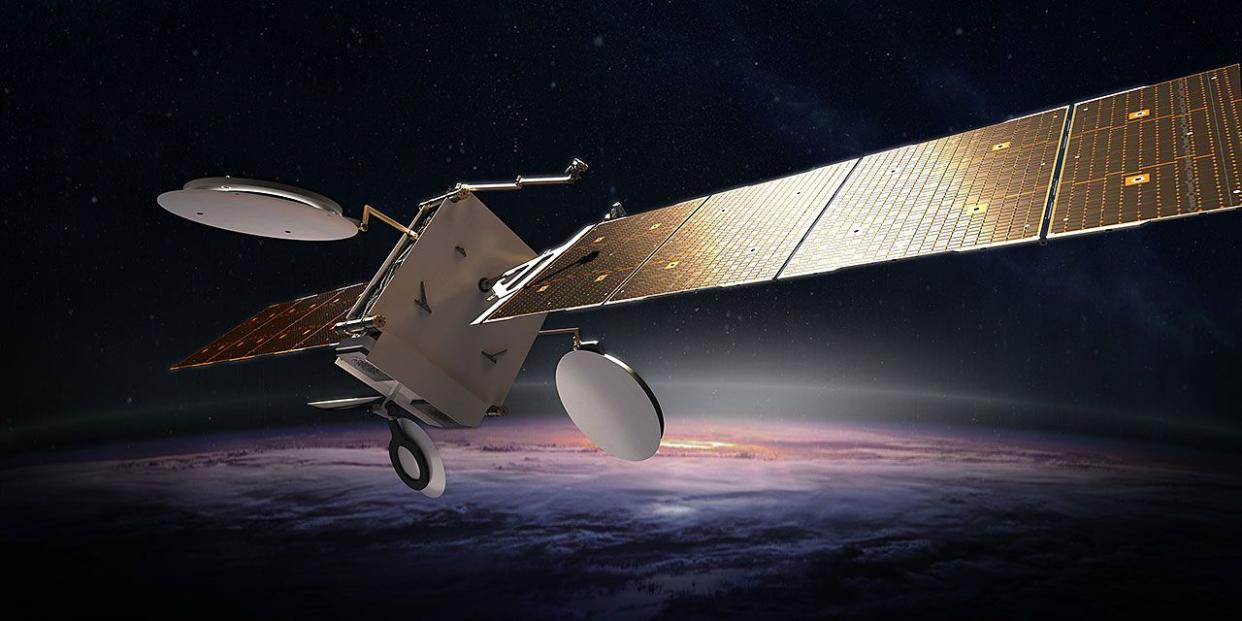Sounds Like DirecTV's Big Satellite Is About to Blow

DirecTV got special permission to send a volatile satellite to early retirement.
Satellites can collide, and DirecTV's satellite has "thermal damage" that could ignite even without a collision.
In a perfect world, all retired satellites are drained of volatile fuel before they're killed.
DirecTV has asked for special permission to move a satellite it says is likely to explode in about a month, The Verge reports. The SPACEWAY-1 is part of parent company AT&T’s satellite TV fleet, launched in 2005 as part of a major satellite TV boom. In an FCC filing, DirecTV says an “anomaly” (the company doesn’t elaborate) in December burned up some of the battery packs, leaving them structurally damaged.
Satellites like SPACEWAY-1 have solar panels that power them for much of the year, and battery power for the brief time during each orbit when they’re in shadow. So although the satellite’s batteries were damaged in December, they won’t be switched on until an upcoming “eclipse season”—the industry name for the time in the shade.
DirecTV’s experts believe the damaged batteries are likely to explode when they’re switched on at the end of February. The SPACEWAY-1 satellite weighs over 13,000 pounds, and it’s one of the largest commercial satellites in a pretty crowded orbit. An actual bomb weighing 13,000 pounds would be toward the heavier end in history, with company like the Tallboy, ASM-A-1 Tarzon (“Tarzan”), and Grand Slam.
SPACEWAY-1 is already 15 years old, which puts it in about the 89th percentile for satellite age. What DirecTV is asking for now is permission to bump the satellite into its final resting orbit and terminate it: “to conduct emergency operations to de-orbit the Spaceway-1 satellite,” the company writes. This requires special permission not only because it’s an emergency, but also because the satellite will be killed while it still has propellant inside.
This differs from the accepted model, where satellites are passivated—literally ”made passive”—by depleting all their fuel before they reach terminal orbit. This reduces the risk of collision and explosion by decommissioned satellites that aren’t being closely monitored anymore, because even collisions of so-called space junk can spin off debris that make other spaceflight more difficult and potentially cause damage.
So SPACEWAY-1 is going to be retired and blasted out to its death orbit without first being depleted, if DirecTV gets the special waiver it’s after. There’s a nonzero risk of some kind of explosion there, based on the baseline risk of collisions between inert satellites in death orbit, but this is much less than the likelihood of an explosion when SPACEWAY-1’s batteries are switched on in February.
What could have happened to the satellite’s batteries? The filing only mentions “an anomaly” and “thermal damage,” and honestly, that could be anything. Satellite parts flicker in and out, often with little explanation. The phrase “thermal damage” makes it sound like a battery made contact with something and overheated, which is a very pedestrian Earth problem.
The FCC has approved DirecTV’s early sundowning of the satellite, and DirecTV says the functions this satellite serves are already redundant with newer satellites.
You Might Also Like


